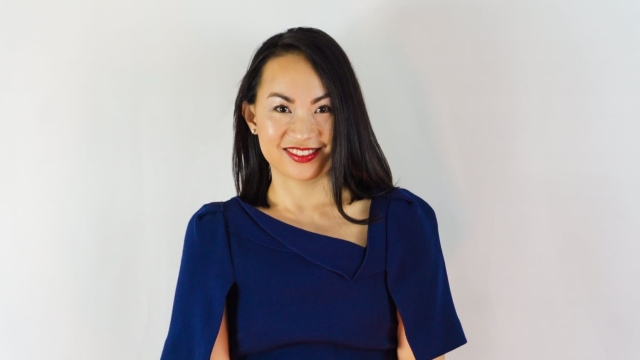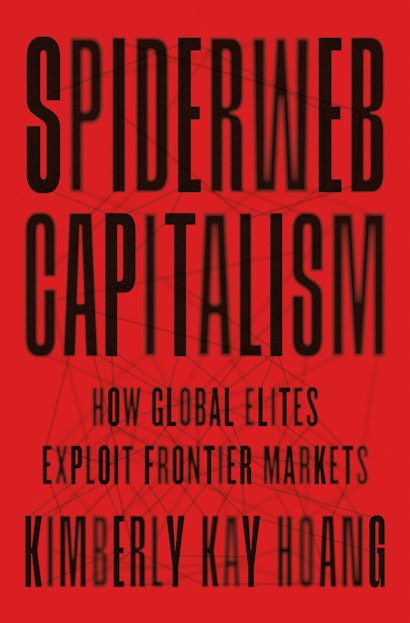Kimberly Kay Hoang is an award-winning scholar, author, teacher, current Professor of Sociology and the College and the Director of Global Studies at the University of Chicago, and the author of two books. Spiderweb Capitalism: How Global Elites Exploit Frontier Markets (Princeton University Press, 2022) and Dealing in Desire: Asian Ascendancy, Western Decline, and the Hidden Currencies of Global Sex Work (University of California Press, 2015). She also received the 2020 Lewis A Coser Award from the American Sociological Association Section on Sociological Theory. Her books and articles have been awarded over 26 prizes from several different professional associations. In addition to her research, she is the winner of the 2018 Llewellyn John and Harriet Manchester Quantrell Teaching Award at the University of Chicago.

Since 1976, the Association of American Publishers’ Awards for Professional and Scholarly Excellence (PROSE Awards) have recognized the very best in professional and scholarly publishing by celebrating the authors, editors, and publishers whose landmark works have made significant advancements in their respective fields of study each year. Today we hear from recent award recipient Kimberly Kay Hoang, author of Spiderweb Capitalism: How Global Elites Exploit Frontier Markets. Hoang’s paper received the 2023 PROSE Award’s highest honor, the R.R. Hawkins Award, as well as the 2023 PROSE Award for Excellence in Social Sciences, and the 2023 category award for Business, Finance, and Management.
The PROSE Awards are one of the few scholarly publishing awards that are presented to publishers, highlighting the extraordinary breadth and depth of professional and scholarly publishing. Hoang, published by Princeton University Press, gives us unique insight into the value that the PROSE Awards bring to the scholarly publishing community.
Association of American Publishers: How has receiving a PROSE award positively impacted Spiderweb Capitalism?
Kimberly Kay Hoang: Receiving these PROSE Awards was an integral part of the increase in Spiderweb Capitalism’s visibility across scholarly communities and contributed to it gaining traction throughout the trade and public book market.
AAP: How do the PROSE Awards strengthen the scholarly publishing ecosystem, from your perspective?
Hoang: The PROSE Awards are one of the few places that both trade and academic works can compete. It can be hard for scholarly works that publish within academic trade presses to gain widespread public attention, and PROSE is one of the few spaces that takes academic and trade presses seriously. It is an important platform to bridge the crossover of academics and trade.
AAP: To follow that, what was the value of the PROSE Awards in your view as an author?
Hoang: PROSE is unique because the awards are truly interdisciplinary. There are individual sub-category fields, overarching categories, and the summatory R.R. Hawkins Award. Being exposed to works in other fields, and having your work alongside these works increases your scholarly profile and exposes you to new disciplines.
Often, authors are kind of ensconced in our individual disciplines, but when we branch out to second and third books, the subject matter is often interdisciplinary. Early in my career, I focused on gender and globalization, but later expanded to law and business. It was personally significant to win a PROSE category award in Business, Finance, and Management, as an author who pivoted scholarship genres.
AAP: Can you talk more about the importance for you of not only winning the overarching R.R. Hawkins Award, but also a category award?
Hoang: For me, the category award was actually the most significant. It feels strange to say, also having won the R.R. Hawkins Award, as it was fantastic to get the R.R. Hawkins Award. However, it was so significant to win the category award, as it was an affirmation of my work crossing over from sociology to include business and law, especially as a woman in a male dominated field.
Anything related to politics and the economy is currently male dominated and it was great to crossover into that space.
AAP: What sort of gaps in the field does your work in Spiderweb Capitalism address?
Hoang: Instead of gaps in the field, I would say that the book bridges interdisciplinary conversations. It draws from legal work, law faculty, geographers, anthropologists, economists, and of course my field of sociology. Often, there are these sorts of disciplinary binders that enable us to see one part of a structure. But, if we put them together, we reveal a much broader structure, and in this case a wider three-dimensional financial web of institutions and people.
In addition, network scholars have these very fancy models for building out networks, right? And I was really interested in the content, or the substantive material that flows between two nodes in a network, as opposed to just the network itself. How are networks in one region of the world connected to other networks in another region of the world, and how can we begin to map out these global financial webs?
AAP: Much of your book focuses on people “playing in the gray.” Can you give a quick preview of what “playing in the gray” means in Spiderweb Capitalism?
Hoang: Playing in the gray is the language used to describe how these businessmen exist on the boundary between legal and illegal activity. It’s a practice where they’re taking strategies that are highly profitable in one market, but are then regulated, and moving those strategies to new frontiers where they are getting ahead of the formal regulatory apparatus in order to make huge amounts of profits.
I would also say playing in the gray is about an emotion. It’s about a gut reaction. It’s about how to make investments in a market where there aren’t highly sophisticated algorithms to calculate risk.
Ultimately, it is finessing the space between what’s legal and illegal.
This interview was originally published by Association of American Publishers.
